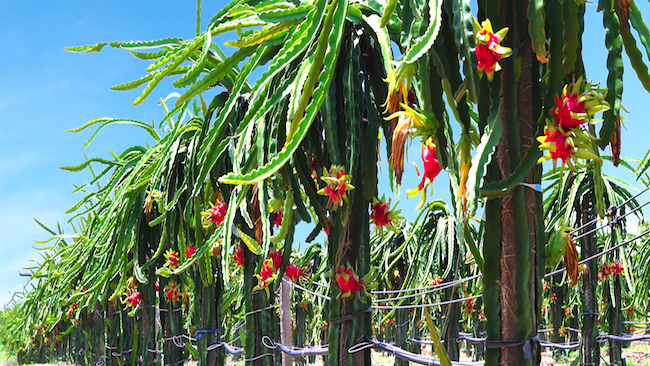Michelin leads the smart mobility revolution with data and AI
Michelin is undergoing a strong transformation by applying AI and smart analytic, helping lead the smart, safe, and sustainable mobility revolution in the Industry 4.0 era.




HAGL Joint Stock Company or HAGL targets to gain a revenue of $273.5 million and gross profit of $121.7 million in 2018 only.
Particularly the fruits sector is expected to contribute 64 percent to the revenue and nearly 80 percent to the gross profit. The rest will come from exploiting the rubber sector, services and apartment sales sector.
HAGL together with its subsidiaries, engages in agriculture business in Vietnam, Laos, Cambodia, Myanmar, and internationally. The company operates through Real Estate, Production, Trading and Services, Construction, Power, and Agriculture segments.

According to a report from the Board of Directors, in 2018, the Group continues to take care of the rubber, palm oil and fruit tree plantations and maintains the plantation of some fruit trees on abundant land in Vietnam, Laos and Cambodia.
The Group will also strive to negotiate with partners with strong financial capacity to mobilize capital and restructure their finance for real estate projects in Myanmar.
According to the 2017 income statement of HAGL, their revenue reduced to $212.8 million, a decrease of 27.9 percent compared to the previous year.
The revenue structure of HAGL has changed considerably over the past two years. In 2016, the turnover of the cattle sector played the largest role in HAGL's revenue structure with a ratio of 51.7 percent, followed by the revenues of real estate transfer sector and commodities with the ration of 11.1 percent and 10.3 percent, respectively.
However, In 2017, the largest contributor of HAGL's revenue was the fruit sector with the contribution rate of 33.3 percent, the cattle sector ranked second with 15.7 percent, followed by the rental service sector with a ratio of 14.9 percent. Especially, the rubber sector also increased notably by 298.2 percent compared to last year, contributing 9.4 percent to total revenue.
Thanks to the large contribution of the fruit sector, HAGL recorded a post-tax profit of $16.4 million in 2017.
In the last few years, the steep fall in the prices of rubber both domestically and overseas has adversely affected the Group’s activities. Dealing with this issue, HAGL has planted short-term industrial trees like sugarcane, oil palm, corn, etc. to diversify the products, realizing the target “short-term earnings take care of long-term investment” .
Since 2016, HAGL has transformed its business strategy, affirming its core business to be the cultivation sector, which focuses on producing fruits for a large scale consumption market. HAGL aims to achieve a strong growth rate, fast harvesting time and economic efficiency on high exploitation area, based on the report of HAGL's management.
Additionally, HAGL continues to maintain a rubber plantation for the long-term future and the cattle sector to provide cultivation sector with fertilizer. Currently, HAGL is taking care of 46,916 hectares of rubber.
In 2017, HAGL also continued to undertake activities to convert plant areas, diversify their products and actively exploit the world's most potential fruit consumption market in China at the moment.
For fruit tree, the Group planted 18 different types of fruit trees on 13,524 hectares area, of which the main crops are banana, dragon fruit, mango, jackfruit, durian and pomelo.
With the advantage of scale, HAGL can work directly with foreign partners, helping to increase profits not only at the plantation stage but also at the whole value chain, cutting down intermediaries in the middle. At present, plants such as lime, dragon fruit and banana have come into operation.
In the field of animal husbandry, in 2017, HAGL planned to gradually narrow the cow herd to focus the capital on fruit trees. In the future, when HAGL is able to balance their working capital, they will then continue to import cattle and reorganize the business of beef.
Although, the profit margin of the cattle sector is not high, this is an important advantage to develop a closed agricultural chain.
Michelin is undergoing a strong transformation by applying AI and smart analytic, helping lead the smart, safe, and sustainable mobility revolution in the Industry 4.0 era.
LG Innotek Vietnam Hai Phong secured a $200 million IFC loan as revenue slows, aiming to expand camera module production while meeting sustainability targets.
For Koen Soenens, Sales and Marketing Director at DEEP C, empathy is a compass that guides major deals, the way a leader builds a team, and the ambition to create a sustainable industrial zone that carries a Vietnamese identity.
Taseco Land has shifted its listing to HOSE and introduced a new upward-pointing arrow logo - a visual statement of its strategy to raise capital, expand its land bank, and strengthen its standing in Vietnam’s real estate sector
Located in the heart of Ho Chi Minh City, SAP Labs Vietnam is the second SAP Labs Network hub in Southeast Asia, following Singapore and is one of 20 countries that have SAP Labs globally.
Solar & Storage Live Vietnam event has been running since 2017 and the 2025 edition will be the biggest yet.